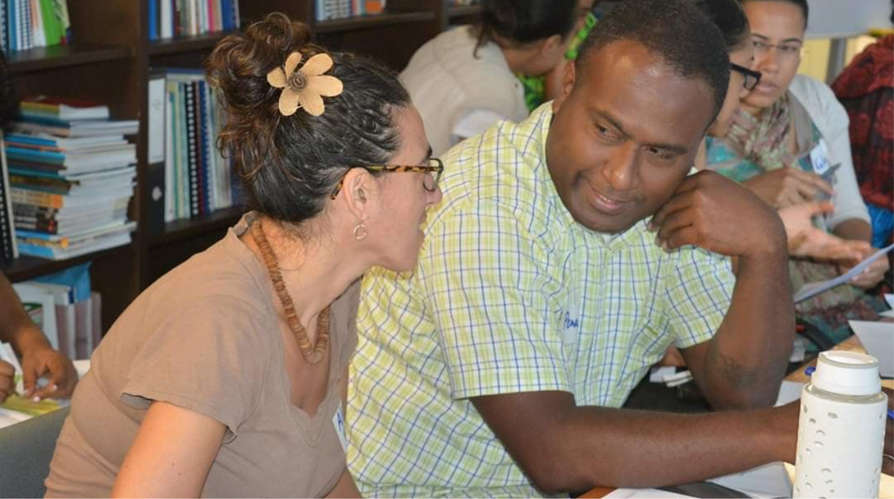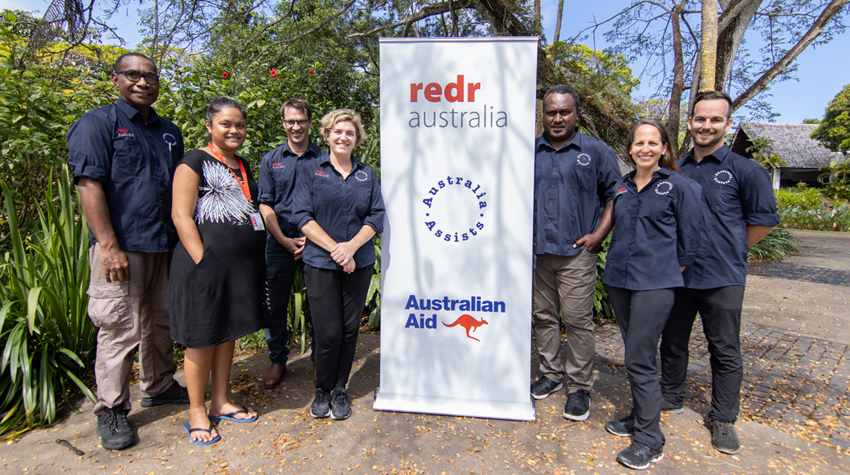In a region where more than 1500 languages are spoken across a population of just 12 million people, it’s hardly surprising that the children of the Pacific Islands grow up speaking more than one tongue. In the case of Penaia Kautia, RedR Australia’s Pacific Regional Coordinator, he was raised in the western part of Fiji’s largest island, Viti Levu, speaking Fijian, English and Hindi.
Now in his work supporting RedR Australia’s humanitarian deployees and partners across the Pacific, Penaia, or Pena as he is known to friends and colleagues, says familiarity with regional languages and, more importantly, a shared cultural understanding, is key to his role.
“There is very much a sense of regionalism across the Pacific,” said Pena. “Even when we may not speak the same language, we have similar values and lifestyles. We also face similar challenges, particularly when it comes to climate-related hazards.”
Despite the multitude of languages spoken across the region, Pena said there are similarities between them. “While I would speak English to a colleague from Tonga or Samoa, there will be words from their languages that are similar to Fijian words.”
 RedR Australia’s Pacific Regional Coordinator, Penaia (Pena) Kautia (right) with a colleague.
RedR Australia’s Pacific Regional Coordinator, Penaia (Pena) Kautia (right) with a colleague.
Building connections and mutual understanding is crucial to success in a region that has a “relationships first” approach to work, Pena explained. But there’s more to it than fluency in local languages.
“It’s always helpful when humanitarians from outside the region try to learn the local language, but those who have the most impact also take the time to get to know their organisation’s driver, receptionist and tea lady.
“Pacific Islanders value everyone’s views and experience, and humanitarians that do the same will be most effective in our region.”
Harnessing local expertise
Recognising the importance of shared cultural understanding and building relationships in effective humanitarian action underpins RedR’s Localisation Strategy. Formalised in October 2020, the strategy details an action plan to boost the number of deployees working in their country of origin and to strengthen local humanitarian leadership.
RedR Australia works with 34 partners across the Pacific – including national disaster management organisations (NDMOs) and government ministries, where deployees work with local actors to coordinate and bolster regional capacity to prepare for, respond to and recover from climate crises and other hazards.
Pena said many Pacific Islander humanitarians are veterans in their own right when it comes to disaster response. “Not only do our local humanitarians experience disasters first-hand in their own communities, but many have lifelong careers on the frontline with local organisations. With their combined language and technical skills, local humanitarians can really hit the ground running.”
To further strengthen this local capacity, RedR Australia piloted the Pacific Essentials of Humanitarian Practice (EHP) course in Fiji in September 2020. The course, contextualised for the Pacific, gave local humanitarians the opportunity to undertake practical, experiential training – as well as the opportunity to join the RedR Roster.
Thirty-four participants representing eight nationalities – 82 per cent from the Pacific – participated in the course. Five Pacific locals have since completed a total of nine deployments in the region. Prior to the pilot, only two Pacific Islanders had deployed through RedR Australia.
Pena said the region’s humanitarians are adding to the expertise of the RedR Roster, which is renowned for the high quality of its members.
“It’s fantastic to see the number of Pacific Islander Roster members and deployees grow, and this will only increase as EHP is expanded throughout the region.
“Our specialists have knowledge of local disasters, the humanitarian sector and the region’s culture that should be utilised in local responses.
“There is also great appetite among young professionals who want to enter the humanitarian sector and contribute their skills to their communities,” Penaia said.
The making of a Pacific humanitarian
Pena’s own pathway to working in the humanitarian sector began after studying commerce, finance and business administration at the Fiji National University and the University of the South Pacific, and a five-year stint working at Fiji’s Ministry for Works and Public Utilities.
In 2016 he took a job working with regional international development organisation The Pacific Community (SPC), initially assisting its HIV program before joining the geo-science division. “This is really what sparked my interest in humanitarianism,” Pena said.
He went on to work across several European Development Fund projects, supporting countries across the region to implement climate change adaptation and sustainable energy initiatives, before moving to the United Nations (UN) Women’s Fiji Multi-Country office.
It was at that point he decided it was time to work on the frontline of humanitarian response and joined RedR Australia as Pacific Regional Coordinator.
In a role key to the organisation’s Pacific operations, Pena coordinates the regional arm of Australia Assists, the Australian Government's humanitarian civilian deployment program managed by RedR Australia.
Coordinating deployees across the full deployment lifecycle, from onboarding right through to getting them back to their home country, Pena also liaises with UN agencies, Pacific Island governments and Australian Government posts across the region.
“It’s rewarding to play a role in the great humanitarian outcomes that deployees achieve for Pacific organisations and communities,” Pena said.



